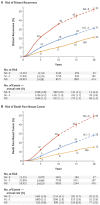Toronto Workshop on Late Recurrence in Estrogen Receptor-Positive Breast Cancer: Part 1: Late Recurrence: Current Understanding, Clinical Considerations
- PMID: 32337479
- PMCID: PMC7049988
- DOI: 10.1093/jncics/pkz050
Toronto Workshop on Late Recurrence in Estrogen Receptor-Positive Breast Cancer: Part 1: Late Recurrence: Current Understanding, Clinical Considerations
Abstract
Disease recurrence (locoregional, distant) exerts a significant clinical impact on the survival of estrogen receptor-positive breast cancer patients. Many of these recurrences occur late, more than 5 years after original diagnosis, and represent a major obstacle to the effective treatment of this disease. Indeed, methods to identify patients at risk of late recurrence and therapeutic strategies designed to avert or treat these recurrences are lacking. Therefore, an international workshop was convened in Toronto, Canada, in February 2018 to review the current understanding of late recurrence and to identify critical issues that require future study. In this article, the major issues surrounding late recurrence are defined and current approaches that may be applicable to this challenge are discussed. Specifically, diagnostic tests with potential utility in late-recurrence prediction are described as well as a variety of patient-related factors that may influence recurrence risk. Clinical and therapeutic approaches are also reviewed, with a focus on patient surveillance and the implementation of extended endocrine therapy in the context of late-recurrence prevention. Understanding and treating late recurrence in estrogen receptor-positive breast cancer is a major unmet clinical need. A concerted effort of basic and clinical research is required to confront late recurrence and improve disease management and patient survival.
© The Author(s) 2019. Published by Oxford University Press.
Figures

References
-
- Sestak I, Regan M, Dodson A, et al. Integration of clinical variables for the prediction of late distant recurrence in patients with oestrogen receptor positive breast cancer treated with 5 years of endocrine therapy. In: San Antonio Breast Cancer Symposium, Philadelphia, PA: American Association for Cancer Research, Inc (AACR). 2017. - PMC - PubMed
LinkOut - more resources
Full Text Sources
